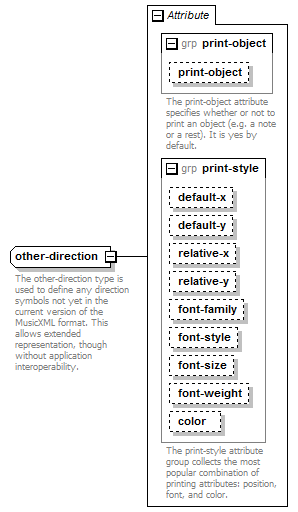other-direction
The other-direction type is used to define any direction symbols not yet in the current version of the MusicXML format. This allows extended representation, though without application interoperability. |
Complex Type Information
Model

Attributes
| QName | Type | Fixed | Default | Use | Inheritable | Annotation |
|---|---|---|---|---|---|---|
| color | color | optional | ||||
| default-x | tenths | optional | ||||
| default-y | tenths | optional | ||||
| font-family | comma-separated-text | optional | ||||
| font-size | font-size | optional | ||||
| font-style | font-style | optional | ||||
| font-weight | font-weight | optional | ||||
| print-object | yes-no | optional | ||||
| relative-x | tenths | optional | ||||
| relative-y | tenths | optional |
Used By
| Element | direction-type/other-direction |
Source
<xs:complexType name="other-direction"> <xs:annotation> <xs:documentation>The other-direction type is used to define any direction symbols not yet in the current version of the MusicXML format. This allows extended representation, though without application interoperability.</xs:documentation> </xs:annotation> <xs:simpleContent> <xs:extension base="xs:string"> <xs:attributeGroup ref="print-object"/> <xs:attributeGroup ref="print-style"/> </xs:extension> </xs:simpleContent> </xs:complexType> |